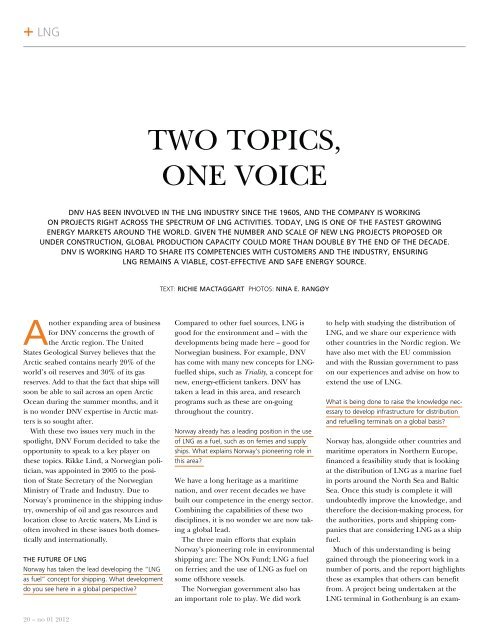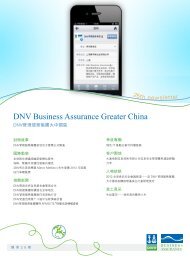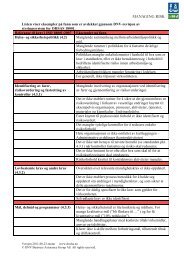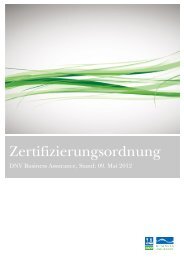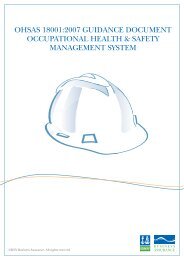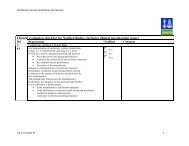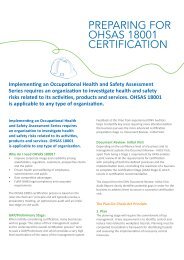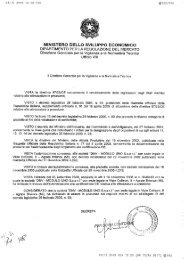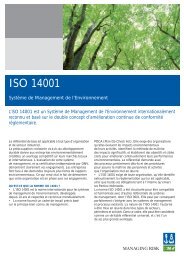Download - DNV Business Assurance
Download - DNV Business Assurance
Download - DNV Business Assurance
Create successful ePaper yourself
Turn your PDF publications into a flip-book with our unique Google optimized e-Paper software.
+ LNG<br />
TWO TOPICS,<br />
ONE VOICE<br />
<strong>DNV</strong> HAS BEEN INVOLVED IN THE LNG INDUSTRY SINCE THE 1960S, AND THE COMPANY IS WORKING<br />
ON PROJECTS RIGHT ACROSS THE SPECTRUM OF LNG ACTIVITIES. TODAY, LNG IS ONE OF THE FASTEST GROWING<br />
ENERGY MARKETS AROUND THE WORLD. GIVEN THE NUMBER AND SCALE OF NEW LNG PROJECTS PROPOSED OR<br />
UNDER CONSTRUCTION, GLOBAL PRODUCTION CAPACITY COULD MORE THAN DOUBLE BY THE END OF THE DECADE.<br />
<strong>DNV</strong> IS WORKING HARD TO SHARE ITS COMPETENCIES WITH CUSTOMERS AND THE INDUSTRY, ENSURING<br />
LNG REMAINS A VIABLE, COST-EFFECTIVE AND SAFE ENERGY SOURCE.<br />
TEXT: RICHIE MACTAGGART PHOTOS: NINA E. RANGØY<br />
Another expanding area of business<br />
for <strong>DNV</strong> concerns the growth of<br />
the Arctic region. The United<br />
States Geological Survey believes that the<br />
Arctic seabed contains nearly 20% of the<br />
world’s oil reserves and 30% of its gas<br />
reserves. Add to that the fact that ships will<br />
soon be able to sail across an open Arctic<br />
Ocean during the summer months, and it<br />
is no wonder <strong>DNV</strong> expertise in Arctic matters<br />
is so sought after.<br />
With these two issues very much in the<br />
spotlight, <strong>DNV</strong> Forum decided to take the<br />
opportunity to speak to a key player on<br />
these topics. Rikke Lind, a Norwegian politician,<br />
was appointed in 2005 to the position<br />
of State Secretary of the Norwegian<br />
Ministry of Trade and Industry. Due to<br />
Norway’s prominence in the shipping industry,<br />
ownership of oil and gas resources and<br />
location close to Arctic waters, Ms Lind is<br />
often involved in these issues both domestically<br />
and internationally.<br />
THE FUTURE OF LNG<br />
Norway has taken the lead developing the “LNG<br />
as fuel” concept for shipping. What development<br />
do you see here in a global perspective?<br />
Compared to other fuel sources, LNG is<br />
good for the environment and – with the<br />
developments being made here – good for<br />
Norwegian business. For example, <strong>DNV</strong><br />
has come with many new concepts for LNGfuelled<br />
ships, such as Triality, a concept for<br />
new, energy-efficient tankers. <strong>DNV</strong> has<br />
taken a lead in this area, and research<br />
programs such as these are on-going<br />
throughout the country.<br />
Norway already has a leading position in the use<br />
of LNG as a fuel, such as on ferries and supply<br />
ships. What explains Norway’s pioneering role in<br />
this area?<br />
We have a long heritage as a maritime<br />
nation, and over recent decades we have<br />
built our competence in the energy sector.<br />
Combining the capabilities of these two<br />
disciplines, it is no wonder we are now taking<br />
a global lead.<br />
The three main efforts that explain<br />
Norway’s pioneering role in environmental<br />
shipping are: The NOx Fund; LNG a fuel<br />
on ferries; and the use of LNG as fuel on<br />
some offshore vessels.<br />
The Norwegian government also has<br />
an important role to play. We did work<br />
to help with studying the distribution of<br />
LNG, and we share our experience with<br />
other countries in the Nordic region. We<br />
have also met with the EU commission<br />
and with the Russian government to pass<br />
on our experiences and advise on how to<br />
extend the use of LNG.<br />
What is being done to raise the knowledge necessary<br />
to develop infrastructure for distribution<br />
and refuelling terminals on a global basis?<br />
Norway has, alongside other countries and<br />
maritime operators in Northern Europe,<br />
financed a feasibility study that is looking<br />
at the distribution of LNG as a marine fuel<br />
in ports around the North Sea and Baltic<br />
Sea. Once this study is complete it will<br />
undoubtedly improve the knowledge, and<br />
therefore the decision-making process, for<br />
the authorities, ports and shipping companies<br />
that are considering LNG as a ship<br />
fuel.<br />
Much of this understanding is being<br />
gained through the pioneering work in a<br />
number of ports, and the report highlights<br />
these as examples that others can benefit<br />
from. A project being undertaken at the<br />
LNG terminal in Gothenburg is an exam-<br />
20 – no 01 2012


